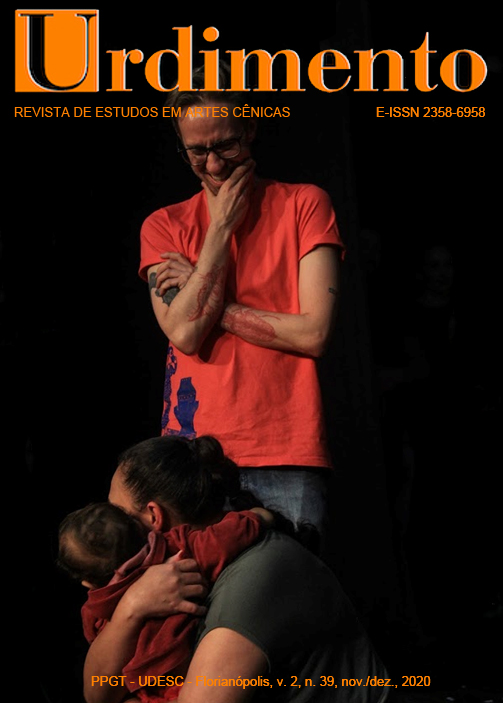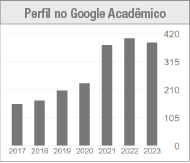Zintkala Woihanbla (Bird Dreams): Drifting and Other Decolonial Performances for Survival and Prison Abolition
DOI:
https://doi.org/10.5965/14145731033920200112Palavras-chave:
Artes de corrección, Colonialismo, Prisão, Performance, Abolição, Antropocentrismo, EnfrentamentoResumo
Scholarship has often overlooked how Native Americans, who are disproportionately incarcerated, have developed tactics to cope with long-term imprisonment. Drawing on the authors’ correspondences and conversations, this essay features decolonial performances for survival and prison abolition, which George Blue Bird (Oglala Lakota) has enacted within conditions of carceral violence. These interlocking tactics are 1. Nurturing connections with more-than-humans; 2. “drifting”, Blue Bird’s term for imagining, traveling, and inhabiting other realms; and 3. Activating freedom and futurities. Ultimately, we focus on that these tactics and Lakota epistemologies offer the prison abolition movement.
Downloads
Referências
American Indian Religious Freedom Act. U.S. Code 42 (1996), § 1, Aug. 11, 1978, 92 Stat. 469.
BLUE BIRD, George. Personal communication, 30 October 2019, South Dakota, United States.
October 2019.
November 2019.
November 2019.
January 2020.
January 2020.
January 2020.
January 2020.
January 2020.
January 2020.
January 2020.
January 2020.
February 2020.
May 2020.
May 2020.
June 2020.
June 2020.
June 2020.
July 2020.
July 2020.
October 2020.
October 2020.
October, 2020, South Dakota, United States.
BLUE BIRD, George. Phone call, 18 June 2020, South Dakota, United States.
July 2020.
July 2020.
August 2020.
August 2020.
September 2020.
September 2020.
October 2020.
BRAULT, Emily R. Sweating in the Joint: Personal and Cultural Renewal and Healing Through Sweatlodge Practice by Native Americans in Prison. Nashville, 2005. Thesis (Doctorate) – Vanderbilt University.
CACHO, Lisa Marie. Social Death: Racialized Rightlessness and the Criminalization of the Unprotected. New York: New York University Press, 2012.
CREWE, Ben, Susie HULLEY, and Serena WRIGHT. Swimming with the tide: Adapting to long-term imprisonment. Justice Quarterly, v. 34, n. 3., p. 517-541, 2017.
CRITICAL RESISTANCE. Dylan Rodriguez, “Abolition Is Our Obligation”. 15 sept. 2017. Available at: https://www.youtube.com/watch?v=JXFO4Hcw9HQ. Accessed on: 14 oct. 2020.
DAVIS, Angela. The Fallacy of Prison Reform. Lecture at Keene State College, 30 sept. 2015. Available at: https://www.youtube.com/watch?v=LfnbnTs0r-M. Accessed on: 14 oct. 2020.
DELORIA, Vine Jr. Indian Humor. In: Custer Died For Your Sins: An Indian Manifesto. New York: Macmillan Press, 1969.
DENETDALE, Jennifer Nez. Reclaiming Diné History: The Legacies of Navajo Chief Manuelito and Juanita. Tucson: University of Arizona Press, 2007.
FLANAGAN, Timothy J. Dealing with long-term confinement: Adaptive strategies and perspectives among long-term prisoners. Criminal Justice and Behavior, v. 8, n. 2, p. 201-222, 1981.
FOSTER, Susan Leigh. Valuing Dance: Commodities and Gifts in Motion. Oxford: Oxford University Press, 2019.
GENTY, Philip M. Damage to family relationships as a collateral consequence of parental incarceration. Fordham Urban Law Review, v. 30, 2002.
GILMORE, and Azzurra CRISPINO. The Case for Prison Abolition: Ruth Wilson Gilmore on COVID-19, Racial Capitalism & Decarceration. Democracy Now, United States, n. 5 may 2020. Available at: https://www.democracynow.org/2020/5/5/ruth_wilson_gilmore_abolition_coronavirus. Accessed on 9 December 2020.
GILMORE, Ruth Wilson, Nick ESTES, Sarah HALEY, and Charles SEPULVEDA. Abolition on Stolen Land. Panel Discussion, University of California Los Angeles, 9 oct. 2020.
GRANT, Elizabeth. PRISON ENVIRONMENTS AND THE NEEDS OF AUSTRALIAN ABORIGINAL PRISONERS. Australian Indigenous Law Review, v. 12, n. 2, p. 66-80, 2008.
HANLEY, Natalia, and Elena MARCHETTI. Dreaming Inside: An evaluation of a creative writing program for Aboriginal and Torres Strait Islander men in prison. Australian & New Zealand Journal of Criminology, v. 53, n. 2, p. 285-302, 2020.
HULT, John. Inmate tablets have now been delivered to all South Dakota prisons. Argus Leader, United States, n. 28 jun. 2017. Available at: https://www.argusleader.com/story/news/2017/06/28/tablets-delivered-all-doc-facilities/432831001/. Accessed on: 14 oct. 2020.
JOHNSON, Robert and Ania DOBRZANSKA. Mature Coping Among Life-Sentenced Inmates: An Exploratory Study of Adjustment Dynamics. Corrections Compendium, v. 30, n. 6, p. 8-9, 36, 38, 2005.
JOHNSON, Robert, and Sandra MCGUNIGALL-SMITH. Life Without Parole, America’s Other Death Penalty: Notes on Life Under Sentence of Death by Incarceration. The Prison Journal v. 88, n. 2, p. 328-346, 2008.
KAEMINGK, Denny. Volunteer Handbook. Sioux Falls: South Dakota Department of Corrections, 2018.
KUSHNER, Rachel. Is Prison Necessary? Ruth Wilson Gilmore Might Change Your Mind. New York Times Magazine, United States, n. 17 apr. 2019. Available at: https://www.nytimes.com/2019/04/17/magazine/prison-abolition-ruth-wilson-gilmore.html. Accessed on: 14 oct. 2020.
LUCAS, Ashley. Traveling Inside: The walls of a prison close off the world; a stage can open it. Plough Quarterly Magazine, n. 25, 12 aug. 2020. Available at: https://www.plough.com/en/topics/justice/social-justice/criminal-justice/traveling-inside. Accessed on: 14 oct. 2020.
MARGOLIASH, Daniel. Song learning and sleep. Nature neuroscience, v. 8, n. 5, p. 546-548, 2005.
MATTINGLY, Kate. Personal communication, 13 October 2020, Utah, United States.
MCKEGNEY, Sam. Into the Full Grace of the Blood in Men: An Introduction. In Masculindians: Conversations about Indigenous Manhood, ed. Sam McKegney. East Lansing, MI: Michigan State University Press, 2014, p. 1.
MERRIAM-WEBSTER. Drift. Merrriam-Webster Dictionary Online, United States, n. 2020. Available at: https://www.merriam-webster.com/dictionary/drift. Accessed on: 14 oct. 2020.
MITHLO, Nancy Marie. No word for art in our language? Old questions, new paradigms. Wicazo Sa Review, v. 27, n. 1, p. 111-126, 2012.
O’REILLY, Kelley, and Jim ECKERT. Building Relationships From the Outside In: A Case Study of Falken Tire's Drift Toward Success. Journal of Relationship Marketing v. 13, n. 3, p. 243-262, 2014.
PELTIER, Leonard. Prison Writings: My Life Is My Sun Dance. ed. Harvey Arden. New York City: St. Martin’s Press, 1999.
POSTHUMUS, David. All My Relatives: Exploring Lakota Ontology, Belief, and Ritual. Lincoln: University of Nebraska Press, 2018.
RODRIGUEZ, Dylan. Forced Passages: Imprisoned Radical Intellectuals and the U.S. Prison Regime. Minneapolis: University of Minnesota Press, 2006.
ROSADO, Alexander. Phone call with Tria Blu Wakpa, 24 September 2020, South Dakota, United States.
ROSS, Luana. Inventing the Savage: The Social Construction of Native American Criminality. Austin: University of Texas Press, 1998.
SANCHEZ, Tony R. “Dangerous Indians” Evaluating the Depiction of Native Americans in Selected Trade Books. Urban Education v. 36, n. 3, p. 400-425, 2001.
SIMPSON, Leanne, and Tanaya WINDER. Falling Into Decolonial Love: An Interview with Leanne Simpson, Author of Islands of Decolonial Love: Stories and Songs. As Us: A Space for Women of the World, v. 4, 2014.
SMITH, Linda Tuhiwai. Decolonizing Methodologies: Research and Indigenous Peoples. London: Zed Books, 1999.
SOTO, Claradina, Toni HANDBOY, Ruth SUPRANOVICH, and Eugenia L. WEISS. The Women of the Cheyenne. In: Women's Journey to Empowerment in the 21st Century: A Transnational Feminist Analysis of Women's Lives in Modern Times. ed. Kristen Zaleski, Annalisa Enrile, Xiying Wang, and Eugenia L. Weiss. Oxford: Oxford University Press, 2019, p. 87-104.
SOUTH DAKOTA DEPARTMENT OF CORRECTIONS. Programs: Paroled Pups. South Dakota Department of Corrections Online, 2020. Available at: https://doc.sd.gov/about/programs/paroled_pups.aspx. Accessed on: 14 oct. 2020.
TERRY, Charles M. The function of humor for prison inmates. Journal of Contemporary Criminal Justice v. 13, n. 1, p. 23-40, 1997.
TOCH, Hans. Studying and reducing stress. In: The pains of imprisonment, eds. R. Johnson and H. Toch. Washington DC: American Psychological Association, 1998, p. 22-44.
WALMSLEY, Roy. World Prison Population List. World Prison Brief. Institute for Criminal Policy Research, 2016. Available at: https://www.prisonstudies.org/news/more-1035-million-people-are-prison-around-world-new-report-shows. Accessed on: 14 oct. 2020.
WHIRLWIND SOLDIER, Lydia. Wancantognaka: the continuing Lakota custom of generosity. Tribal College v. 7, n. 3, p. 10, 1996.
WHITE HAT, Albert. Reading and Writing the Lakota Language. Salt Lake City: University of Utah Press, 1999.
WILBUR, Matika, and Adrienne KEENE. Healing The Land IS Healing Ourselves. All My Relations Podcast, 26 may 2020. Available at: https://www.allmyrelationspodcast.com/podcast/episode/4bb3fff4/healing-the-land-is-healing-ourselves. Accessed on: 14 oct. 2020.
WILSON, Sean. Research Is Ceremony: Indigenous Research Methods. Nova Scotia: Fernwood Publishing Co. Ltd., 2008.
ZAMBLE, Edward. Behavior and adaptation in long-term prison inmates: Descriptive longitudinal results. Criminal Justice and Behavior, v. 19, n. 4, p. 409-425, 1992.
Downloads
Publicado
Como Citar
Edição
Seção
Licença
Copyright (c) 2020 Urdimento - Revista de Estudos em Artes Cênicas

Este trabalho está licenciado sob uma licença Creative Commons Attribution 4.0 International License.
Declaração de Direito Autoral
Os leitores são livres para transferir, imprimir e utilizar os artigos publicados na Revista, desde que haja sempre menção explícita ao(s) autor (es) e à Urdimentoe que não haja qualquer alteração no trabalho original. Qualquer outro uso dos textos precisa ser aprovado pelo(s) autor (es) e pela Revista. Ao submeter um artigo à Urdimento e tê-lo aprovado os autores concordam em ceder, sem remuneração, os seguintes direitos à Revista: os direitos de primeira publicação e a permissão para que a Revista redistribua esse artigo e seus meta dados aos serviços de indexação e referência que seus editores julguem apropriados.
Este periódico utiliza uma Licença de Atribuição Creative Commons– (CC BY 4.0)




